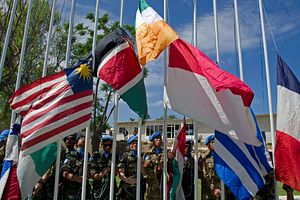This week, senior peacekeepers from the Association of Southeast Asian Nations (ASEAN) met in Phnom Penh for the 3rd ASEAN Peacekeeping Centers Network Meeting.
As I have noted previously, since most ASEAN members have participated to varying degrees in United Nations peacekeeping operations and have already set up national peacekeeping training centers, the grouping has set up a network among these centers – known as the ASEAN Peacekeeping Centers Network (APCN) – and has held meetings on the subject with the first being held in 2012 in Malaysia (See: “Malaysia Wants an ASEAN Peacekeeping Force”).
These meetings, as Prak Sokhonn, the chairman of Cambodia’s National Coordination Committee of UN Peacekeeping Operations put it at the opening ceremony in Phnom Penh on Wednesday, offer a platform for participants to share views and experiences on peacekeeping missions and enhance relations among ASEAN peacekeepers.
In terms of outcomes, according to the Phnom Penh Post, Major General Ker Savoeun, director of the Cambodian defense ministry’s peacekeeping center, said that this meeting had agreed on high-level exchanges in which peacekeeping heads would facilitate “an exchange in expertise.”
The outcomes represent a continuation of the incremental progress ASEAN has been making in the peacekeeping realm. According to the UN, ASEAN has collectively contributed almost 5,000 peacekeeping personnel, which represents about 5 percent of global contributions. As I noted before, Malaysia, which holds ASEAN’s rotating chairmanship this year, has been advancing a far bolder proposal for an ASEAN peacekeeping force which still facing some familiar obstacles within the grouping (See: “ASEAN Eyes Closer Military Ties in 2015”).
Progress has been made, however, on the adoption of a concept paper on an ASEAN Militaries Ready Group on Humanitarian Assistance and Disaster Relief, which Malaysian prime minister Najib Razak mentioned at the recent UN Peacekeeping Summit in New York.
The ASEAN Ready Group, according to a press statement issued by Malaysian defense minister Hishammuddin Hussein on October 4 seen by The Diplomat, would be a dedicated force comprised of specialists in disaster relief and military medicine from all ASEAN countries under a single banner. It would train together, develop common procedures and interoperability, and would be dispatched immediately in the event of a calamity upon request by a host country. It would also have special predetermined diplomatic clearance for entry, special lines of communications and pre-identified human resource and equipment.
































